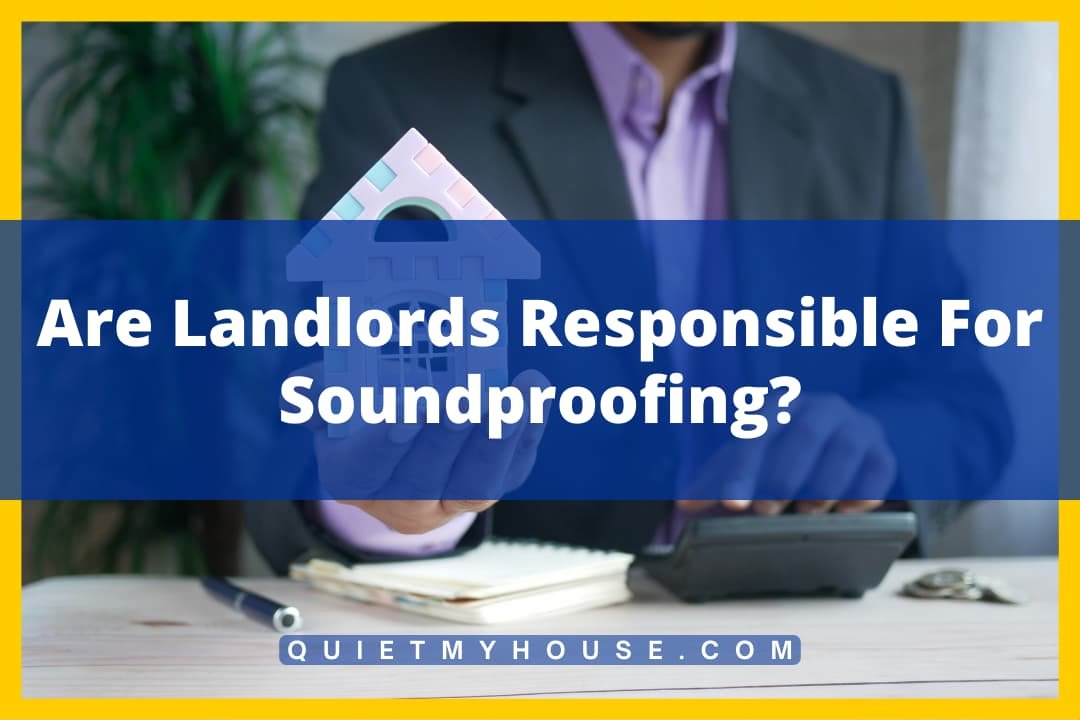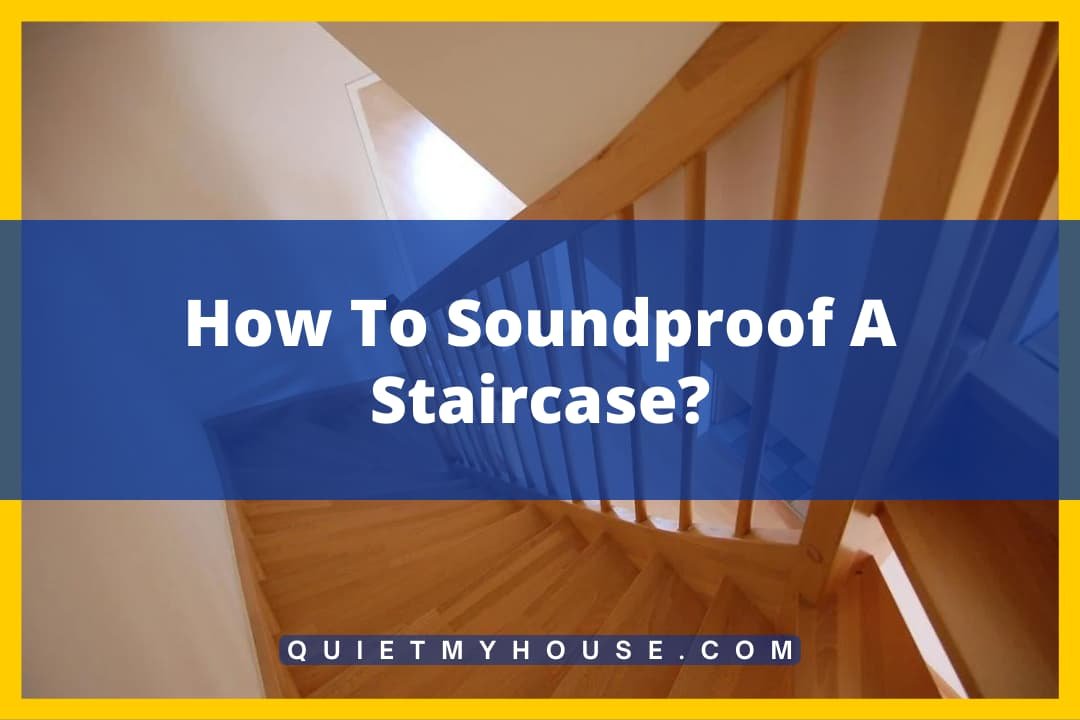If your neighbor next door, above your floor, or below your floor is playing their bass speakers or subwoofers loudly, you’ll probably feel the ground shake and hear the noise of the bass. Luckily, there are many ways that you can stop hearing your neighbor’s bass in your house, or block the sound from entering your home in the first place.
The easiest way to muffle the vibration of bass from a neighbor is to talk to them. If the neighbor doesn’t comply and continues to play their bass music loudly, some soundproofing methods include using foam acoustic panels, white noise, weatherstrip tape, or soundproofing the floor and ceiling.
These methods of soundproofing are not the same as soundproofing for regular sound, as bass travels differently than other sounds. Continue reading to find out how the process for minimizing bass differs from soundproofing other sounds, and how to best get rid of the bass sound coming from your neighbors.
How Bass Sound Waves Travel Differently Than Other Sound Waves

Before you can effectively minimize the sound of bass coming from your neighbor’s apartment or house, you should understand how bass differs from other acoustics.
If you’ve ever owned a set of speakers or a modern car stereo, you’ve probably seen that there is a volume setting for bass that is separate from the overall volume of the speakers. The sound of the bass is what you can feel, rather than necessarily hear, which can help you to better understand how it travels.
Unless it causes a lot of rattling to its surroundings, you can’t always hear the bass. Instead, what you hear is the vibration of the speaker’s surroundings.
This is because the sound waves of bass are so low in frequency that they travel through solid objects and buildings, whereas other sound waves of higher frequency travel through the air and are detected by your ears.
As the low frequencies of bass travel through building structures and objects, it creates vibrations and thus can be felt better than they can be heard. This is why, even if you have really good soundproofing walls, floors, and ceilings, you can still “hear” your neighbor’s bass as it passes through solid objects, or even through the ground and shakes the structure of your home.
These lower frequencies can’t be blocked using traditional soundproofing methods and instead needs more dense soundproofing.
Discuss Your Concerns With Your Neighbors
If you notice your neighbor’s music speakers or subwoofers in their home are creating so much bass that it is bothersome, the first step to take is to try to talk to them. But before you approach them about your concerns, you should wait it out the first time they cause a disturbance.
This could be a one-time thing, or someone else could have approached them about it, and their bass may never disturb you again. If you hear or feel the bass pumping the night after, or a few nights later, then it may be a good time to go talk to them.
You should be patient and calm in your approach because you may never know why their music and bass are so loud. If they sense you’re annoyed or angry with them, they may turn their music up even louder out of spite, but you should also never assume that they have malicious intentions.
They may not even realize that you can feel or hear their bass, or they could be hard of hearing, and cranking up the bass helps them to listen to their favorite songs.
Most of the time, if you approach them respectfully and kindly ask them to turn the bass down so that you can sleep better or simply enjoy your peace, they will return the kindness back to you and make sure not to disturb you with their music anymore.
If they choose to continue playing their music loudly to purposefully or knowingly cause disturbances, especially late at night, or they respond in a threatening manner, you should contact the police to report a noise complaint.
The police won’t press charges against the person until multiple complaints have been issued by various different people, but they will let them know their music and bass are causing a disturbance.
Try Mounting Acoustic Panels to Your Walls

If your neighbors are not compliant and continue to play music with their bass cranked up, or you simply just don’t want to talk to them and instead take matters into your own hands to modify your home, you can follow this next option. The next thing you could try doing is mounting acoustic panels to your walls if your neighbors playing the loud bass live next door.
These acoustic panels are made of foam that helps absorb sound, but regular acoustic panels won’t do the trick. Instead, you’ll want to purchase very dense, thick foam panels that are manufactured to absorb lower frequencies like bass.
You’ll want to purchase several of these to cover the wall in which you feel the most bass. This is best for neighbors who are next door and share a wall with your apartment or condo. If your neighbors live on the floor above or below you, try the next option.
Soundproofing Your Ceiling or Floor
If your bass-cranking neighbor lives on the floor above you or below you, try soundproofing your floor or ceiling. Unfortunately, there isn’t much you can do to absorb the bass coming from your floor if they live below you.
Your best option is just to lay down a large, thick rug, in the room that gets the most vibration, particularly right above where they most likely have their speakers set up.
The thick rug can help absorb those low frequencies. Otherwise, your other option is to install rubber floor mats beneath your carpet, but this would require you to remove your carpet and get permission from your landlord if you’re renting.
Luckily, unless their speakers are set up right next to a wall or mounted to a wall, the bass from the neighbors below you won’t be able to travel much through your floor, and will instead bother the neighbors below them much more than they will bother you.
If you can feel the bass frequencies traveling through your walls, you can use the soundproofing method above of mounting dense acoustic panels to your walls.
If you notice the bass coming from above and traveling through your ceiling from an upstairs neighbor, you can soundproof your ceiling. To do this, you can mount double-thick acoustic foam panels to your ceiling using a spray adhesive. This will help absorb those low frequencies that travel through your ceiling and to your ears.
Another option that is not quite as thick as the double-thick foam panels are mass-loaded soundproofing vinyl, which you can attach to your ceiling. This is best installed above the sheetrock on your ceiling, which can be time-consuming and costly, and you’ll need to get permission from your landlord if you have a rental.
Another less aesthetically pleasing way to install it would be stapling the vinyl directly to the outside of the ceiling, which doesn’t require you to remove the sheetrock.
Weatherstripping Your Door

If your neighbor lives next door in another building or home and their bass is too loud, or you consistently get people driving through your neighborhood with their subwoofers cranked to maximum and it shakes the ground, you can try weatherstripping your door.
This will help prevent those low frequencies from passing through the cracks of your door. You can add a weatherstrip to the bottom edge of your outside door, and use weatherstrip tape for the doorframe.
This is a foam adhesive tape that you’ll attach to the doorframe right where the door meets the frame so that it blocks any light coming through the cracks of the door and therefore prevents sound from traveling through.
This can also work in an apartment building where the neighbor across from you plays loud music with the bass cranked up. If this doesn’t fully do the trick, you can also add dense acoustic foam panels to the door itself.




